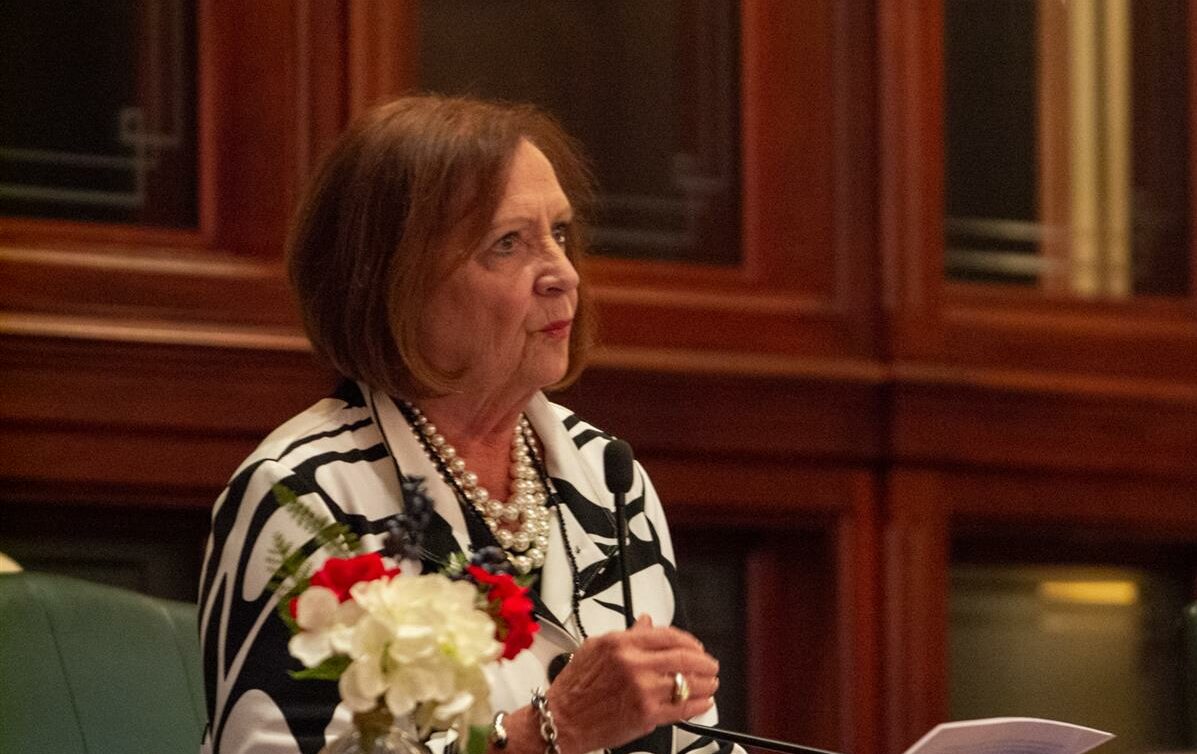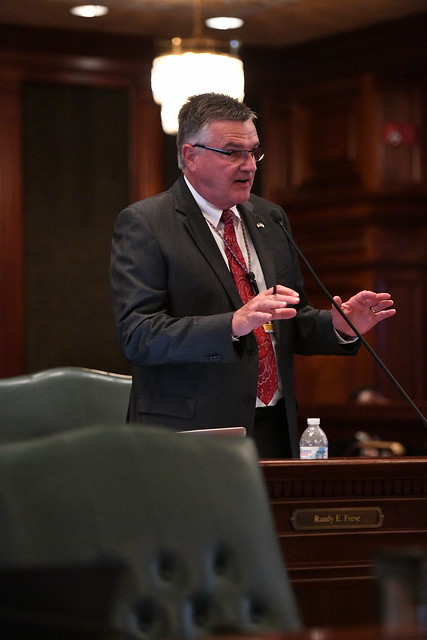Once again working through the night, Illinois House finalizes $53.1 billion budget; Pritzker says he will sign it

After a near-derailment and an all-nighter to wrap up the General Assembly’s spring session, supermajority Democrats in the Illinois House gave final legislative approval to the state budget as the sun rose Wednesday morning.
Despite holding 78 seats in the chamber, it took Democrats three tries to reach the 60 votes needed to approve more than $1.1 billion in revenue increases, including a tax hike on sportsbooks and businesses, to balance the $53.1 billion spending plan for fiscal year 2025.
The spending plan passed 65-45, with seven Democrats joining Republicans in opposition.
The revenue plan that capped the voting on the budget-related bills was more of a challenge. House Bill 4951 fell one vote short of passage twice after 4 a.m. due to attendance issues. On the third try – after about an hour of procedural maneuvering by Republicans that left Democrats reeling – the bill passed at 4:43 a.m. with the minimum 60 votes necessary.
“This tax and spend budget forces struggling Illinois families to once again pay more of their hard-earned dollars for a variety of Democrat spending priorities including $1 billion more in support for illegal migrants and even another pay raise for the legislators themselves…the third raise in two years,” Rep. Randy Frese (R-Quincy) said. “Every year, Democrats’ spend more than we are taking in in revenues, and every year their answer is to raise your taxes to pay for it. As Yogi Berra would say, it’s ‘déjà vu all over again’.”

“You – you passed these rules,” Rep. Patrick Windhorst, R-Metropolis, scolded Democrats after the majority party voted to suspend the House rules in order to bring the revenue plan up for a vote a third and final time.
“I think it should be clear to everyone in the state what this supermajority is willing to do to ram a tax increase down the throats of the citizens of Illinois at 4:30 in the morning,” he added.
Democrats had earlier highlighted that despite a tight fiscal year, the budget would send $198 million to the state’s “rainy day” fund and make the full payment into the state’s pension systems that is required by law.
Rep. Jehan Gordon-Booth, a Peoria Democrat and the lead budget negotiator in the House, pointed to the state’s nine credit upgrades of the past four years. And she noted a backlog of unpaid bills that reached nearly $17 billion seven years ago under Republican Gov. Bruce Rauner has shrunk to a bill payment cycle that lasts “mere days.”
“Democrats have set this state on a fiscally responsible course, one that will continue with today’s state budget,” she said.

State Rep. Jehan Gordon-Booth, D-Peoria, introduces the state’s operating budget in the early hours of Wednesday morning at the Capitol. The budget passed after 1 a.m., with Gordon-Booth calling it “balanced, responsible and fair.” (Capitol News Illinois photo by Jerry Nowicki)
Gov. JB Pritzker says he’ll sign the plan for the fiscal year that begins July 1, which spends about $400 million more than what he requested in his February budget address. In a statement after its passage, the governor claimed investments made in the budget will grow Illinois’ economy and continue a “track record of fiscal responsibility” while prioritizing working families.
“From expectant mothers and their newborn babies to people with disabilities to veterans to seniors who need our care, we’re keeping our promises to all Illinoisans and the most vulnerable among us,” Pritzker said.
The budget cleared the General Assembly five days after lawmakers had scheduled their spring session’s adjournment, although the May 24 “deadline” was a largely arbitrary date that left a week on the calendar as a contingency plan. Negotiations were complicated by inflation and other spending pressures driving up the expected cost of government, while economists predict the state’s economy will slow in the upcoming fiscal year.
Still, Democrats approved the spending plan with several votes to spare but no Republican support – as they’ve done every year in Pritzker’s tenure except the first in 2019.
Republicans argued the pace of spending growth – and the fact that some of the revenues raised to pay for it are temporary – set the state on pace for an even tighter fiscal year 2026.
Overall, state spending grew by about 5 percent from last year’s enacted plan, or about 1.6 percent above expected end-of-year expenditures following a supplemental spending plan’s inclusion in the budget package this week.
Democrats highlighted a $50 million appropriation for a child tax credit for children under 12 if their household qualifies for the state’s Earned Income Tax Credit. The plan contains $200 million for after-school and summer youth programs and $45 million for grants through the Reimagine Public Safety Act aimed at violence reduction.
But Republicans accused Democrats of having misplaced priorities, pointing to hundreds of millions of dollars for programs serving noncitizens.
The budget includes $182 million to provide shelter, health care and other services for recently arrived migrants, many of whom have been bused to the state from Texas. And it includes $440 million from the GRF for two programs providing state-funded Medicaid-like benefits to noncitizens, with $189 million from other state funds as well.
New revenues
More than $1.1 billion in added revenue was needed to balance the books, so lawmakers extended an expiring cap on corporate net operating losses to ensure that $526 million in tax dollars wouldn’t disappear in FY25. Another $25 million will be raised by subjecting “re-renters” of hotel rooms to an existing state hotel tax.
Sportsbooks will see their current 15 percent tax rate on profits increase via a new graduated structure that will tax between 20 and 40 percent, based on profits. The change is projected to bring in about $200 million to the state’s General Revenue Fund. A 1 percentage point increase to the tax on the state’s video gambling industry would generate an additional $35 million for infrastructure projects next year.
The revenue plan also caps a tax discount claimed by retailers at $1,000 monthly, generating $101 million for state coffers and about $85 million for municipalities.
To appease retailers, lawmakers included a prohibition on financial institutions and credit card companies charging fees on the sales tax and gratuity portion of electronic transactions beginning July 1, 2025.
The Illinois Retail Merchants Association was also given a $5 million line item for workforce grants.

Rep. Fred Crespo, D-Hoffman Estates, watches as a revenue bill needed to enact the budget fall one vote short of passage early Wednesday morning. Ultimately, the bill would pass once recalled for a vote. (Capitol News Illinois photo by Jerry Nowicki)
Rep. Fred Crespo, D-Hoffman Estates, voted for the budget, but during debate over the revenue proposal, he said he was disappointed that leadership didn’t consider hiring freezes, changes to weight loss drugs covered by state insurance or other spending controls he suggested.
“There’s really only one place you can look at getting these revenues, and that’s taxpayers,” he said before voting against the bill. “And at this rate, ladies and gentlemen, we’re gonna run out of taxpayer dollars to spend.”
The budget package also freed up about $200 million in revenue by redirecting $150 million from the Road Fund and $50 million from the Leaking Underground Storage Fund to public transit. The move was opposed by organized labor because it diverts Road Fund money to the state’s discretionary spending fund, but Democrats promised it would only happen in the upcoming fiscal year.
“I can go through this list of tax increases that you’re using to say that you’re being good fiscal stewards of the state’s money,” Rep. C.D. Davidsmeyer, R-Jacksonville, said in a committee hearing Tuesday evening before the early morning vote. “Meanwhile, I’m hearing about making sure that there’s Democrat pork projects, to make sure that you can get the votes for your budget.”

Rep. C.D. Davidsmeyer, R-Jacksonville, questions Democrats about their $53.1 billion spending plan on the House floor. (Capitol News Illinois photo by Jerry Nowicki)
Davidsmeyer contended Democratic senators were each given the authority to request $3 million in district-specific infrastructure projects in the budget, while Democratic members of the House got about $1.5 million each. Republicans were shut out of requesting their own member initiatives.
District-specific projects have been used time and again to incentivize members to vote for the budget, with the Chicago Tribune tracking at least $150 million in infrastructure spending for lawmaker-led initiatives in the current-year budget. No spokespeople would confirm or deny the amount allocated for lawmaker initiatives.
The final roughly 80 pages of the budget bill contain a long list of projects, most of them ranging from $50,000 to $1 million sums to various specifically named businesses, local governments and other entities.
Infrastructure and more
Despite the diversion of money from the Road Fund, the budget includes $3.5 billion for infrastructure – about $500 million more than what Pritzker had outlined in his February budget proposal.
That includes $500 million to support the development of a regional quantum information science and technology campus, allocated from a specific economic-development focused bond fund known as Build Illinois.
Another bill allowing the Department of Commerce and Economic Opportunity to designate “quantum campuses” also lays out infrastructure and business incentives to lure developers of new-age higher-speed computing technology to the state. That measure also expands and extends several other popular tax credit programs, such as the Reimagining Energy and Vehicles Act and the Economic Development for a Growing Economy, or EDGE, program.
The state’s municipalities, meanwhile, will get another $400 million for local road projects, a measure that helped neutralize their opposition to a part of the budget plan that eliminates one of their sources of revenue – the statewide 1 percent grocery tax.
But the grocery tax repeal won’t happen until 2026, and local governments will be given authority to enact their own grocery tax up to 1 percent without a referendum. Home rule jurisdictions will be able to increase their sales tax by up to 1 percent without a referendum as well.
Other spending items include:
- Funding for a 5 percent pay hike for lawmakers’ base salary to $93,712. State law sets lawmakers’ pay to increase annually with inflation, and lawmakers took no action to stop it from occurring in FY25.
- The annual $350 million increase in K-12 education funding, called for by a 2017 law that overhauled Illinois’ school funding formula.
- A 2 percent – or $30 million – increase for community colleges and public universities.
- A $10 million increase to Monetary Award Program grants for lower-income college students.
- Full funding for Pritzker’s “Smart Start” plan aimed at adding 5,000 preschool seats across the state and providing workforce grants.
- $14 million to launch the newly created Department of Early Childhood, which Pritzker has promised would streamline services currently provided by three different state agencies.
- $45 million for a teacher vacancy pilot program to help underserved districts with teacher retention.
- A $1 hourly increase for direct service professionals who serve individuals with intellectual and developmental disabilities in community-based settings.
- An increase totaling $70 million for Community Care Program workers serving older adults who can’t live independently.
- $5 million for a tax credit program for news outlets beginning in 2025 and claimable the following year.
- $10 million for the governor’s plan to erase $100 million in total medical debt for Illinoisans through a partnership with the nonprofit Undue Medical Debt. House Bill 5290 laid out that applicants must earn 400 percent of the federal poverty level or less.
- $900 million for renovation at state prisons, including a possible tear down and rebuild of Stateville and Logan Correctional Centers.
- $4 million to create a statewide maternal health plan and distribute grants to community-based reproductive health care providers.
- $155 million for safety net hospitals.
- A $90 million increase for Home Illinois, a program created last year to address homelessness, bringing total funding to $290 million.
Hannah Meisel contributed.
Capitol News Illinois is a nonprofit, nonpartisan news service covering state government. It is distributed to hundreds of print and broadcast outlets statewide. It is funded primarily by the Illinois Press Foundation and the Robert R. McCormick Foundation, along with major contributions from the Illinois Broadcasters Foundation and Southern Illinois Editorial Association.
Miss Clipping Out Stories to Save for Later?
Click the Purchase Story button below to order a print of this story. We will print it for you on matte photo paper to keep forever.

